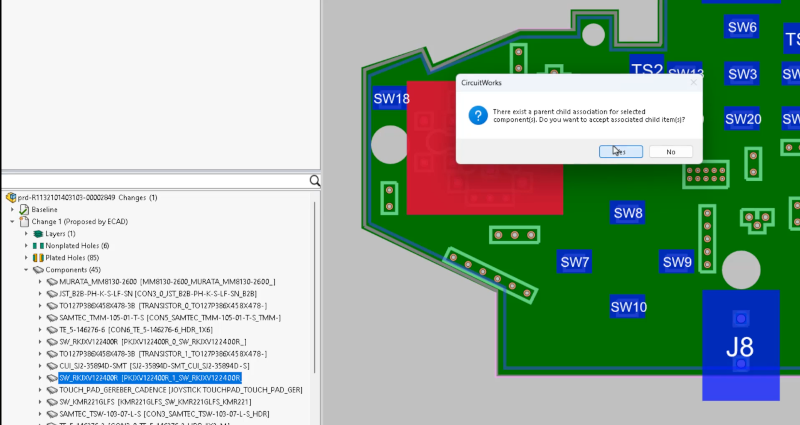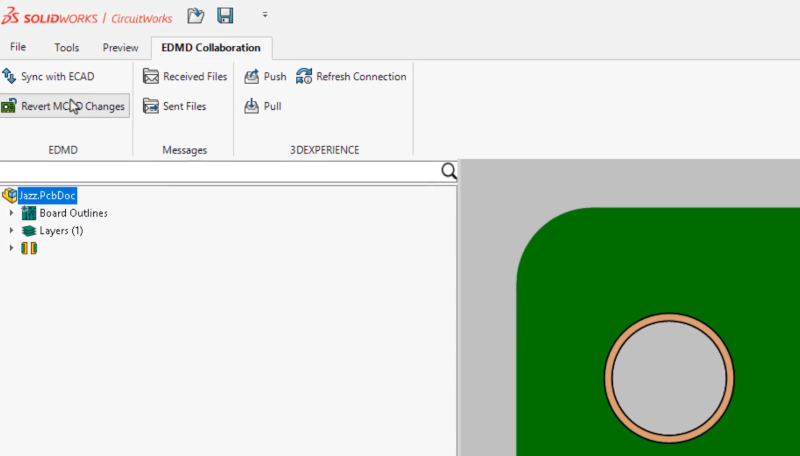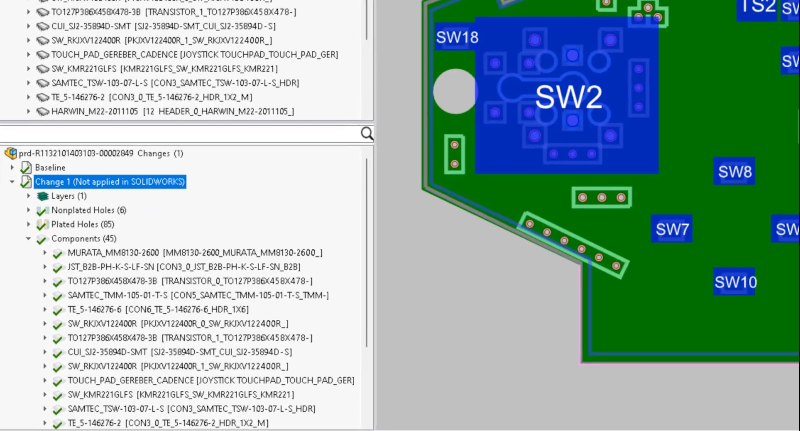What’s New in SOLIDWORKS ECAD-MCAD Collaboration
One of the key aspects of design is collaboration, and we’ve been diligently working to enable mechanical and electrical designers to exchange models back and forth more seamlessly to review changes and provide feedback, if needed.
Key improvements in SOLIDWORKS 2025 include a new user interface, the ability to accept PCB outline changes, and the capability to make board modifications from either the MCAD or ECAD side. Additionally, CircuitWorks is now available in SOLIDWORKS Standard, Premium and Professional, enabling two-way collaboration.
CircuitWorks is an add-in available in SOLIDWORKS CAD software that brings PCB design into the SOLIDWORKS ecosystem, allowing for further integration between ECAD and MCAD teams. CircuitWorks is a collaboration tool that enables users to import PCB layout information directly to their parametric SOLIDWORKS designs and define assemblies within SOLIDWORKS that can then be sent to the PCB tool of your choice.
In this blog, I want to discuss recent enhancements for ECAD- MCAD collaboration that we’ve delivered in the 3DEXPERIENCE SOLIDWORKS and SOLIDWORKS with Cloud Services functional delivery updates, including R2025x FD01. The update includes CircuitWorks support for parent-child associations, the ability to undo MCAD changes in CircuitWorks, and a collaboration recovery feature if your system unexpectedly restarts.
Support Parent-Child Relationship in IDX 3.0 – sync parent and children in a single action.
Easily maintain the parent-child relationship when using IDX files for ECAD-MCAD collaboration.
CircuitWorks now supports parent-child associations between components and other board items, such as keep-in, keep-out, plated holes, and non-plated holes, when interacting with IDX 3.0 files. You can accept or reject changes to these items from either ECAD or MCAD, providing the ability to sync both items in a single action. If you accept or reject changes at the top level, you can sync those changes at the lower level, if needed, and vice versa.
When modifying parent components in MCAD, all related child items are updated automatically during the export to CircuitWorks.
To use this feature, do the following:
- Click Tools > CircuitWorks > CircuitWorks Options.
- Select ProStep EDMD and select Use parent-child association in IDX communication.

Ability to Overwrite Previous Push – IDX 3.0 – undo unnecessary or incorrect MCAD changes to keep CircuitWorks and SOLIDWORKS in sync.
You can now undo the latest IDX-based MCAD changes in CircuitWorks and revert to older versions as long as the electrical designer has not started working on them. When MCAD proposes a change, you can reverse it in the EDMD Collaboration section if ECAD has not processed the task. This restores both SOLIDWORKS and CircuitWorks to the last synchronized state.
This enhancement improves collaboration by enabling CircuitWorks users to check and undo MCAD changes before ECAD implementation, reducing errors and rework.
To revert MCAD changes:
- In CircuitWorks, select the EDMD collaboration section.
- Click Revert MCAD Changes.

Automatic Collaboration Recovery – resume workflow after an unexpected system interruption.
CircuitWorks now includes a collaboration recovery feature that lets you resume ECAD-MCAD workflows in case of an external system interruption, such as a power outage.
You can use this feature to reopen the IDX file being used in collaboration. To resume collaboration, open the first backup file in the EDMD Collaboration folder (identify the baseline .idx file by its timestamp). This preserves your workflow and minimizes disruption.

To see these enhancements in action, log into the 3DSwym What’s New page here. For more electrical updates, see this blog.




